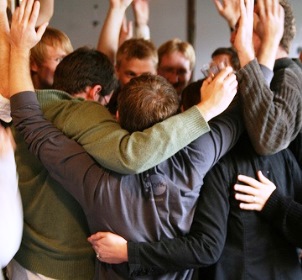 There is a God-impulse in the hearts of millions of believers around the world for what could be called “authentic relationships” in contrast to the relational sterility common in religious constructs. This pursuit is, in my opinion, birthed of God’s Spirit. However, there is no limit to the creative capacities of our carnal religious nature to ruin a beautiful thing!
There is a God-impulse in the hearts of millions of believers around the world for what could be called “authentic relationships” in contrast to the relational sterility common in religious constructs. This pursuit is, in my opinion, birthed of God’s Spirit. However, there is no limit to the creative capacities of our carnal religious nature to ruin a beautiful thing!
Some are following this impulse by removing themselves from “organized” institutional forms of Christianity.
There are some very legitimate reasons for the migratory search. However, disillusionment can quickly set in. Many discover that a mere change of geography a few times a week no more realizes authenticate relationship than changing cheese in a mouse trap makes it less a death-trap for a mouse! Getting out of an organization is the easy part. Getting non-kingdom values out of my mind and heart is where the real work begins. The increase of His resurrection life shared one with another, displacing our carnality is what is needed, not merely a change in meeting venue and method.
Authentic relationship is not:
- A commodity that I have to manage.
- Defined by our meeting structure.
- A principle I leverage for personal advantage.
- A duty I must maintain.
- An event I must attend.
- A concept I must preach to others.
- A spiritual destination I arrive at.
- A spiritual bauble (trinket or shiny decoration) I add to my self-interest
Searching for Authentic Relationships in Church
Authentic relationship is the overflow into time and space of the reality of my union with God, and with you. Relationship is union-based, not meeting-based. Relationship starts with a revelation of our union, not a revelation of “correct meeting methodology.” Relationship is not a static condition we arrive at. Relationship is an unfolding story of people in love with each other who have been bonded together by an act of the Holy Spirit, who grow in love and purpose together.
In various contacts and conversations I have around the world, I have noticed a very peculiar strain of emerging thought that has to do with trust in relationships. I recently wrote what I thought was a very simple phrase regarding trust. I said:
“Trust is hard to earn, easy to lose, and next to impossible to recover when betrayed, short of an act of the Spirit in the human heart.”
I thought this was harmless and somewhat self-evident. I was surprised at the amount of hostility and negativity I received in response. The teaching/sentiment floating around (and it is held with a fair degree of aggressiveness) believes that we are to trust no one other than the Person of the Lord Himself. It is contended that to trust any human is to engage in some sort of “less-than,” or weak/deficient spirituality. [1] I have even had some tell me that the scripture never exhorts us to trust another human being. Hmmmm . . . we better take a look at that. Something unhealthy is going on.
The individuals espousing this line of thought, tend to have one thing in common: they tend to be those who have been severely disillusioned with church, spiritually abused, or severely mistreated by church leadership. They have had a bad church experience (www.badchurchexperience.com). To be touchy on the subject of trust makes my point in my quotation above. When trust is betrayed, it can be quite a journey of healing to be able to trust again.
Now, if “expectations of outcome” are confused with trust, I can somewhat understand the sentiment. If in relationship mutual expectations concerning personal needs are established, and those agreed upon expectations are not met, then it’s a matter of repentance and forgiveness one with another for not fulfilling a properly articulated and managed expectation. If I have not kept my word I have failed in loving/caring for another. However, I have no right to be offended in interpersonal dynamics when there’s not been advance mutual agreement to expectations.
If I get offended or hurt by actions that are “morally neutral” and for which there’s no mutual agreement, it’s my issue. Failure of others to meet my unarticulated emotional expectations, my self-perceived “needs,” is not sin. I am not responsible for another’s (assuming adult peers, not minors) poor or unjust treatment of me, but I must also self-reflect as to why I did not exercise appropriate personal boundaries in the relationship to stop the behavior. Projecting my own soul damage or unarticulated emotional expectations onto another human being is sin! Allowing my feelings over such things to escalate into judgments against others and relational breakdown is sin!
Of course, in the sense of perfect-sin-free-faithfulness in relationship, only the Lord qualifies for absolute trust. However, it’s impossible to function as a human society without some degree of trust. It’s impossible to have a mercantile economy without trust: commerce is based on trust. It’s impossible to be a community in love with each other if every member is withholding his or her heart from other members because of distrust or a fear of being hurt. It’s not possible to love without the risk of being hurt by having one’s love rejected by another. Risk free love does not exist this side of eternity. The problem is not with trust. It is with misplaced trust in untrustworthy people!
Part of the difficulty comes from the KJV English translations and concordances. If you look for the word “trust” or “trust someone,” you will not find much. The problem is the word translated as “faithful” in the KJV (and other translations) means trustworthy, faithful in duty, worthy of belief, fidelity, trust, or confidence, not full of faith as in the sense of “proper belief.” Here is just a partial short list of references to trust: 1 Cor. 7:25, 1 Tim 1:12, 2 Tim 2:2, 1 Pet. 4:19, Rev. 19:11. The KJV faithful literally means: “to put near to someone in trust.” When Paul says to commit these things to “faithful men,” (2 Tim. 2:2) he means men of fidelity, trustworthiness. He means faithful men, not “men of faith.” Contrary to some of the assertions I have been hearing, the scriptures do not prohibit trusting those who are less than perfect Deity!
Conclusion
My wife, Rita, has a concise saying about trust: “I trust every human being to be human, and I trust my Father to be my Father: when humans let me down, He makes up the difference in my soul.” That’s a great way to live at peace with one’s self, and with humanity. It’s a great way to trust. My little one liner is: “I hope for the best, and expect the worst from humanity, and I am rarely disappointed!” I think my wife’s attitude is healthier!
Authentic relationship is the platform that allows for love and trust to develop. Love may be given and received freely without contingency, but trust is earned by degree. Love does not require me to allow myself to be violated by those who have proven in their actions to be untrustworthy. When love is allowed to bloom, a culture of safety and acceptance is developed, repentance and forgiveness is learned, and trust grows. Proven trust becomes the fertilizer for yet deeper still authentic relationships and boundless potential for kingdom expansion.
By Steve Cr0sby
[1] John 2:24 – Jesus did not commit himself to them. The KJV word “commit” is pisteuo. It is the same word used in the NT for believe, to have faith in. Jesus did not “believe” in what was in humanity’s heart regarding “human” potentialities of bringing divine purpose to bear, particularly His Father’s purpose for His own life. This passage is not dealing with interpersonal human relational dynamics.________________________________________________
Copyright 2013, Dr. Stephen R. Crosby, http://www.swordofthekingdom.com; #http://www.badchurchexperience.com. Permission is granted to copy, forward, or distribute this article for non-commercial use only, as long as this copyright byline, in totality, is maintained in all duplications, copies, and link references. For reprint permission for any commercial use, in any form of media, please contact st**********@***il.com.
Would you like to partner with us in distributing our materials and perhaps generate some income for yourself? Please go to http://www.stevecrosby.com for details of our Affiliate program. This ministry is sustained by the freewill offerings of those believe in the message of a radical grace in a new covenant understanding. If this article has been a blessing to you, would you prayerfully consider making a tax-deductible contribution through our Paypal button to help? Thank you and God bless you.










































[…] is a great need in the Church today to focus on relationships and learn to minister these 58 one anothers. John […]
[…] More on this topic […]